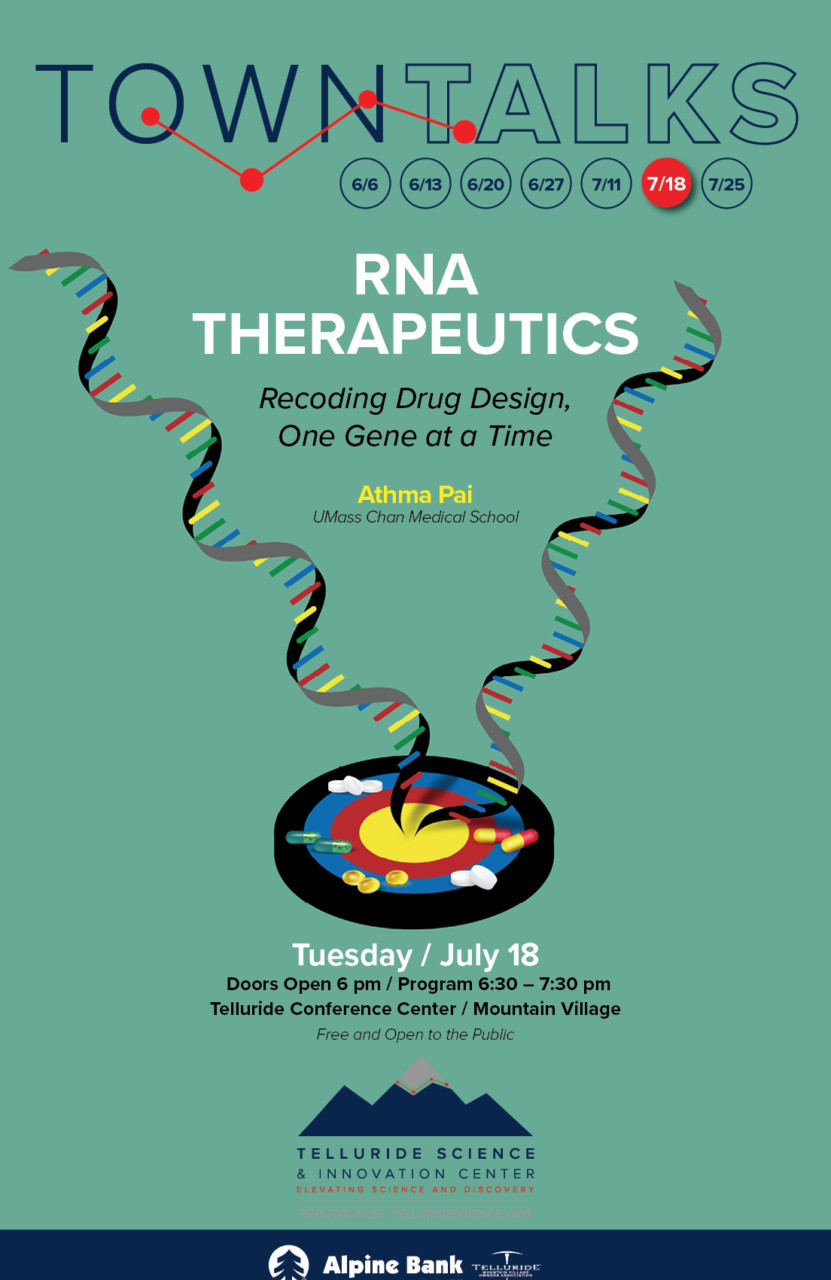
13 Jul Telluride Science Town Talk: “RNA Therapeutics: Recoding drug design, one gene at a time,” 7/18!
This coming week the 2023 Telluride Science Town Talks series continues with Dr. Athma Pai on “RNA Therapeutics: Recoding drug design, one gene at a time.” The event takes place July 18, 6:30 pm, at the Telluride Conference Center in Mountain Village. Town Talks are FREE and open to the public.
Visit telluridescience.org to learn more about Telluride Science and the capital campaign to transform the historic Telluride Depot into the Telluride Science & Innovation Center. The venue will be permanent home for Telluride Science and a global hub of inspired knowledge exchange and development where great minds get to solve great challenges.
The 2023 Telluride Science Town Talks series is being presented by Alpine Bank with additional support from the Telluride Mountain Village Owner’s Association.
Go here for more on Telluride Science.
Go here for more on Town Talks.

This is not snake oil. This is for real: RNA interventions could mean the end of diseases that are the stuff of nightmares. The medical industry has long been slow to change, but RNA therapies look to dramatically advance treatments in a wide range of afflictions such as cancer, sickle cell anemia, hepatitis C, and more.
Since the onset of the SARS-CoV-2 pandemic, the world has become familiar with the RNA molecule and the speedily-developed mRNA vaccine:
“I think [the SARS-CoV-2 pandemic] makes the research much more appreciated, and it also kind of gives more credence to many of these companies that were founded well before the pandemic, who are now going out seeking funding and also, to a certain extent, to research the need for seeking funding for doing RNA research…It was kind of a reassuring thing to see… the hope that the vaccine development gave is that the work we are doing can really bringing about change,” said Dr. Athma Pai.
RNA is part of the central dogma of biology: it helps code for specific proteins that are essential for all human biological functions. RNA-based therapy works by using its molecules to target specific genes and their expression in DNA. Because they can be readily adapted to new targets, the use of RNA therapies is likely to grow in the coming years due to this flexibility and efficiency.
Yet, there are many challenges involved in these treatments, such as keeping RNA molecules stable at very low temperatures (even as low as -112 degrees fahrenheit).
“So, some of the larger challenges are things that are actually a problem for the RNA vaccine and that is delivering and that is being able to stabilize molecules…But, more importantly, the cell doesn’t like it when we input foreign RNA…And, it actually kicks off an immune response, which is problematic…And you need to be able to deliver these molecules in such a way that they go to the right regions.”
Dr. Athma Pai
Raised by two scientists, Athma Pai was genetically predisposed to become a scientist. And, when she graduated high school, the race to complete the Human Genome Project inspired her to enter the field of genetics.
“But then, when I was graduating from high school in 2003, that was when the Human Genome Project was completed, and I think that was what really got me interested DNA…I remember distinctly for my 16th birthday, one of our family friends gave me a whole series of genetics books, saying ‘hey, you might like these,’ and it was right when all the newspaper articles and headlines were about nearing this race to completion to do the Human Genome Project. And, I realized that that was pretty cool and so I said, ‘hey, let me go study that in college.’”
After completing her PhD in human genetics at the University of Chicago, Dr. Pai realized that the one thing she didn’t fully grasp was the processes of RNA, so she decided to study RNA genomics at MIT.
Eventually, Dr. Pai was awarded an NSF CAREER grant for $1 million to support her studying of mRNA splicing and to provide internships for Worcester-area secondary and undergraduate students.
“Every gene that is made into RNA, every process of transcribing RNA molecules has some ‘noise.’ There is a low level of mistakes or ‘noise’ that occur when making RNA molecules. Normally that isn’t a problem. What we want to do is understand how much ‘noise’ exists at the gene level, then we can target the ‘noise’ to reduce the level of mistakes.”
So is RNA therapeutics the next silver bullet to change the face of medicine? Find out at Dr. Athma Pai’s upcoming talk.


Sorry, the comment form is closed at this time.